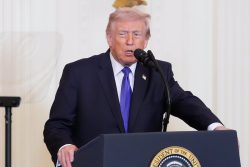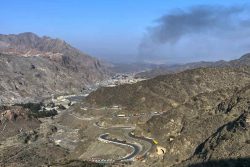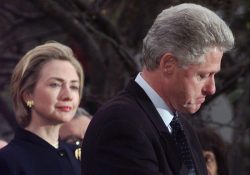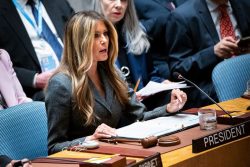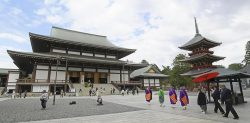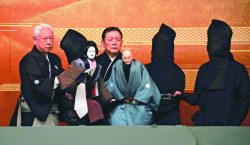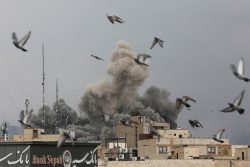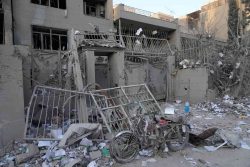Netanyahu Tells UN That Israel Is ‘at the Cusp’ of a Historic Agreement with Saudi Arabia
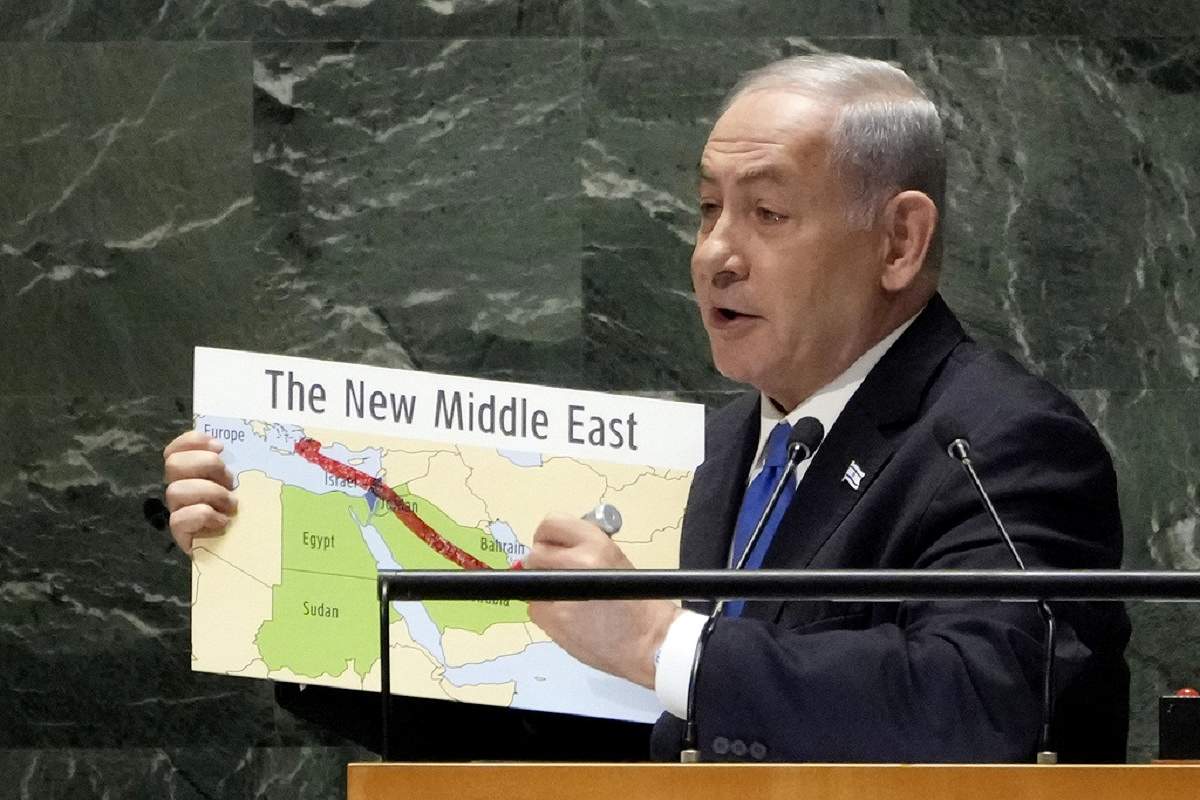
Israel’s Prime Minister Benjamin Netanyahu uses a red marker on a map as he addresses the 78th session of the United Nations General Assembly, Friday, Sept. 22, 2023.
10:46 JST, September 23, 2023
UNITED NATIONS (AP) — Israeli Prime Minister Benjamin Netanyahu told the U.N. General Assembly on Friday that Israel is “at the cusp” of a historic breakthrough leading to a peace agreement with Saudi Arabia, without outlining a clear path over the significant obstacles facing such an accord.
He struck an optimistic tone throughout his roughly 25-minute address — and, once again, used a visual aid. He displayed contrasting maps showing Israel’s isolation at the time of its creation in 1948 and the six countries that have normalized relations with it, including four that did so in 2020 in the so-called Abraham Accords.
“There’s no question the Abraham Accords heralded the dawn of a new age of peace. But I believe that we are at the cusp of an even more dramatic breakthrough, an historic peace between Israel and Saudi Arabia,” Netanyahu said. “Peace between Israel and Saudi Arabia will truly create a new Middle East.”
There are several hurdles in the way of such an agreement, including the Saudis’ demand for progress in the creation of a Palestinian state — a hard sell for Netanyahu’s government, the most religious and nationalist in Israel’s history.
The Saudis are also seeking a defense pact with the United States and want help in building their own civilian nuclear program, which has fueled fears of an arms race with Iran.
Netanyahu told Fox News on Friday evening that the “window of opportunity” for a deal with the Saudis was “the next few months.”
“If we don’t achieve it in the next few months, we might delay it by quite a few years,” Netanyahu said.
Saudi Arabia’s Crown Prince Mohammed bin Salman said in an interview with Fox News this week that the two sides are getting closer to an agreement, without providing much detail about the U.S.-led negotiations. He declined to specify what exactly the Saudis are seeking for the Palestinians.
Netanyahu said the Palestinians “could greatly benefit from a broader peace,” saying: “They should be part of that process, but they should not have a veto over the process.”
Peace talks between Israel and the Palestinians broke down more than a decade ago, and violence has soared over the past year and a half, with Israel carrying out frequent military raids in the occupied West Bank and Palestinians attacking Israelis. Netanyahu’s government has approved thousands of new settlement homes in the West Bank, which Israel captured in the 1967 war and which the Palestinians want for the main part of their future state.
Palestinian President Mahmoud Abbas, who addressed the General Assembly on Thursday, made no direct reference to efforts to reach a normalization agreement between Israel and Saudi Arabia. But he reiterated the centrality of the Israeli-Palestinian conflict, which has only worsened since the Abraham Accords were signed.
“Those who think that peace can prevail in the Middle East without the Palestinian people enjoying their full and legitimate national rights are mistaken,” Abbas said.
Netanyahu has often seemed to revel in using the podium of the General Assembly to lambast Israel’s enemies.
He famously held up a picture of a cartoon bomb in 2012 to illustrate Iran’s advancing uranium enrichment. In 2020, he claimed Hezbollah was stockpiling explosives near Beirut’s airport, prompting the Iran-allied militant group to organize an immediate visit by journalists, who saw heavy machinery but no weapons.
The map he held up this year made no reference to the West Bank, Gaza or east Jerusalem, territories Israel captured in 1967 that the Palestinians want for their future state. The map appeared to show Israel encompassing all three.
The chamber was largely empty during his address, though there was a group of Netanyahu supporters who clapped several times during his speech. Protesters and supporters of Netanyahu demonstrated across the street from the U.N. headquarters.
Netanyahu referred to the cartoon bomb when he held up the maps, pulling out a red marker and drawing a line showing a planned trade corridor stretching from India through the Middle East to Europe. The ambitious project, unveiled at this month’s Group of 20 summit, would link Saudi Arabia to Israel.
He also reprised his longstanding criticism of Iran, which Israel views as its greatest threat. Netanyahu referred to Iran’s crackdown on protests, its supplying of attack drones to Russia for use in Ukraine, and its military activities across the Middle East.
Netanyahu called for stepped-up sanctions over Iran’s nuclear program, which has steadily advanced since the United States withdrew from a landmark agreement with Iran and world powers to which Israel had been staunchly opposed.
Iran’s President Ebrahim Raisi, who also attended the General Assembly, urged the U.S. to lift sanctions in order to return to the nuclear deal. Iran has always insisted its nuclear program is entirely peaceful, but the U.S. and others believe it had a secret weapons program until 2003.
Raisi also denied Iran had sent drones to Russia following its invasion of Ukraine. U.S. and European officials say the sheer number of Iranian drones being used by Russia shows that the flow of such weapons intensified after hostilities began.
In an ambiguous turn of phrase during his address, Netanyahu said that “above all, Iran must face a credible nuclear threat.” The prime minister’s office later issued a clarification, saying he meant to say ”credible military threat.”
Israel, which is widely believed to have nuclear weapons but has never publicly acknowledged them, has repeatedly said all options are on the table to prevent Iran from getting nuclear weapons.
Top Articles in News Services
-

Survey Shows False Election Info Perceived as True
-

Hong Kong Ex-Publisher Jimmy Lai’s Sentence Raises International Outcry as China Defends It
-

Japan’s Nikkei Stock Average Falls as US-Iran Tensions Unsettle Investors (UPDATE 1)
-

Japan’s Nikkei Stock Average Touches 58,000 as Yen, Jgbs Rally on Election Fallout (UPDATE 1)
-

Japan’s Nikkei Stock Average Rises on Tech Rally and Takaichi’s Spending Hopes (UPDATE 1)
JN ACCESS RANKING
-

Producer Behind Pop Group XG Arrested for Cocaine Possession
-

Japan PM Takaichi’s Cabinet Resigns en Masse
-

Man Infected with Measles Reportedly Dined at Restaurant in Tokyo Station
-

Israeli Ambassador to Japan Speaks about Japan’s Role in the Reconstruction of Gaza
-

Videos Plagiarized, Reposted with False Subtitles Claiming ‘Ryukyu Belongs to China’; Anti-China False Information Also Posted in Japan


